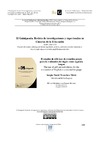Please use this identifier to cite or link to this item:
https://accedacris.ulpgc.es/jspui/handle/10553/70295
| DC Field | Value | Language |
|---|---|---|
| dc.contributor.author | Francisco Déniz, Sergio David | en_US |
| dc.date.accessioned | 2020-02-14T13:36:29Z | - |
| dc.date.available | 2020-02-14T13:36:29Z | - |
| dc.date.issued | 2019 | en_US |
| dc.identifier.issn | 2386-3374 | en_US |
| dc.identifier.uri | https://accedacris.ulpgc.es/handle/10553/70295 | - |
| dc.description.abstract | En este artículo se pretende indagar sobre el tipo de evaluación competencial partiendo de la base de que esta metodología concibe tanto el tipo de aprendizaje como el conocimiento de una manera diferente a los métodos de aprendizaje más tradicionales. Por lo tanto, se demuestra que la evaluación debe ser eficiente y corresponderse con el tratamiento de las competencias clave. Además, se presenta la rúbrica de creación propia como un instrumento de evaluación adecuado y preciso ya que se ajusta a la tarea social en concreto que se va a desarrollar en el aula. Para ello, se presenta un ejemplo que ha sido diseñado y puesto en práctica en nuestra tesis doctoral. | en_US |
| dc.description.abstract | The aim of this article is to go deep in the analysis of the evaluation of the Key Competences. This methodology deals with a new way of learning as well as a new concept of the new knowledge which differs from the most traditional learning methods. Thus, it is demonstrated that the evaluation should be efficient and related to the treatment of the Key Competences. Moreover, a self-created rubric is included as a useful and precise evaluation instrument that suits the specific social task that will be developed in the classroom. For this reason, an example, that was designed and put into practice in our Ph.D., is showed. | en_US |
| dc.language | spa | en_US |
| dc.relation.ispartof | El Guiniguada | en_US |
| dc.source | El Guiniguada [ISSN 0213-0610], v. 28, p. 138-153 | en_US |
| dc.subject | 58 Pedagogía | en_US |
| dc.subject | 531204 Educación | en_US |
| dc.subject.other | Competencias clave | en_US |
| dc.subject.other | Tarea social | en_US |
| dc.subject.other | Evaluación | en_US |
| dc.subject.other | Rúbricas | en_US |
| dc.subject.other | Key competences | en_US |
| dc.subject.other | Social task | en_US |
| dc.subject.other | Evaluation | en_US |
| dc.subject.other | Rubrics | en_US |
| dc.title | El empleo de rúbricas de creación propia para la evaluación del inglés como segunda lengua | en_US |
| dc.title.alternative | The use of self-created rubrics for the evaluation of English as a second language | en_US |
| dc.type | info:eu-repo/semantics/article | en_US |
| dc.type | Article | en_US |
| dc.identifier.doi | 10.20420/ElGuiniguada.2019.271 | en_US |
| dc.investigacion | Artes y Humanidades | en_US |
| dc.type2 | Artículo | en_US |
| dc.identifier.ulpgc | Sí | es |
| dc.description.sellofecyt | Sello FECYT | |
| dc.description.esci | ESCI | |
| dc.description.dialnetimpact | 0,0 | |
| dc.description.dialnetq | Q3 | |
| dc.description.erihplus | ERIH PLUS | |
| item.grantfulltext | open | - |
| item.fulltext | Con texto completo | - |
| Appears in Collections: | Artículos | |
Page view(s)
61
checked on Jan 10, 2026
Download(s)
76
checked on Jan 10, 2026
Google ScholarTM
Check
Altmetric
Share
Export metadata
Items in accedaCRIS are protected by copyright, with all rights reserved, unless otherwise indicated.
